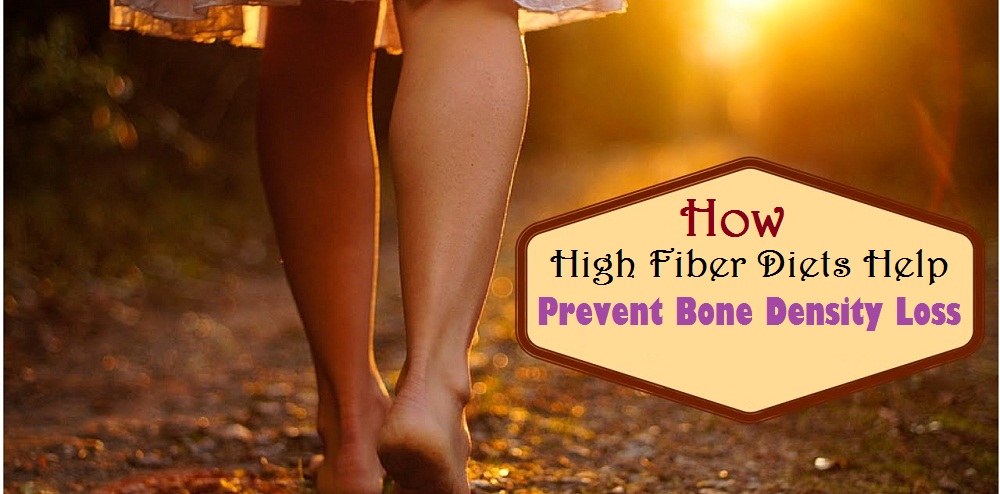Are you going through menopause? Do you feel worried about osteoporosis and bone density loss in general? If your answer to either one of these two questions is yes, this article is more than perfect for you.
In the paragraphs that follow, we will discuss high fiber diets and how these can be used to prevent bone density loss. Enjoy your read and do not hesitate to share your new found information with friends or family members, who are going through similar problems.
Bone Density Loss, A Common Occurrence In Menopause
All women go through menopause, this period signifying that the fertile years have gone by. Menopause brings a lot of hormonal changes, which are highly likely to influence a person’s general health. The absorption of calcium becomes impaired, and bone density loss appears as a common occurrence of menopause.
Unfortunately, the loss of bone density increases the risk of vertebral fractures, affecting a person’s level of independence and functionality. A potential solution to the problem is represented by the high fiber diet, as you will have the opportunity to read below.
The High Fiber Diet, An Excellent Weapon Against Bone Density Loss
The high fiber diet is one of the easiest methods that we can use, to fight bone density loss and other similar changes that occur with menopause. According to a patient leaflet developed by specialists at the University of California, the diet is one of the major risk factors associated with bone density loss.

Our bodies require fiber, to function in a healthy manner. Insoluble fibers are necessary for a healthy intestinal transit as well, with common sources including whole grain wheat, nuts, seeds, green veggies (zucchini, celery, green beans), tomatoes, etc. Soluble fibers are easily absorbed, providing the body with vitamins and minerals; sources include legumes, fruits, and root vegetables.
Last, but not least, you have the prebiotic soluble fibers, which have immense benefits for a person’s general health. These include, among others, asparagus, yams, onions, garlic, and leeks.
High Fiber & Calcium Sources, Helping You Say Goodbye To Osteoporosis
When you have reached a certain age, it is only normal you would be interested in menopause products. These are often presented in the form of supplements, helping you maintain healthy and strong bones. Apart from calcium and vitamin D supplements, you can also take fiber supplements, as these are meant to help you stay just as healthy.
According to an article published online on Physicians Committee, the diet represents one of the easiest ways to counteract the effects of menopause and prevent bone density loss. The healthy calcium sources presented in this article are also rich in fiber, so it makes sense to include them in your daily diet. Some of the recommended healthy food choices include black turtle beans, broccoli, Brussels sprouts, butternut squash, celery, chickpeas, collard greens, dried figs and sweet potato.
High-Fiber Diet With Anti-Inflammatory Properties
The high-fiber diet has anti-inflammatory properties, being able to improve the symptoms experienced by those diagnosed with rheumatoid arthritis and osteoarthritis. According to material published on the website of the Arthritis Foundation, a high-fiber diet can reduce the severity of the inflammation and thus improve the overall level of functionality for the patients diagnosed with the above-mentioned conditions.

The material draws attention to the fact that there are numerous studies, in which it was confirmed that the high-fiber diet contributes to a reduction in C-reactive protein values. It is a known fact that CRP is an inflammatory marker, often associated with inflammatory conditions, such as rheumatoid arthritis and osteoarthritis. It seems that the high fiber diet contributes to maintaining healthy bacteria at the level of the gastrointestinal tract, thus lowering the inflammation in various parts of the body.
Even fiber supplements, such as psyllium, are capable of reducing the level of CRP, thus inhibiting inflammatory processes. The material recommends that the daily fiber intake should be between 20 and 35 grams per day, including all of the three fiber categories that were mentioned above. It is essential to understand that the fiber intake should be increased gradually. Otherwise, it can lead to uncomfortable symptoms, such as bloating and constipation.
Final Word
If you want to prevent bone density loss and serious conditions, such as osteoporosis, you should give the high fiber diet a try. Seek out healthy fiber sources and increase your intake gradually, as advised. If you are going through menopause, it is essential to manage this change in an effective manner. Consume more fiber, take fiber supplements if necessary and choose menopause products that are suitable for your symptoms. You can take medicine that promises to reduce both the intensity and frequency of menopause hot flashes, a common occurrence in post-menopausal women.








